unit 4 problems and advice
牛津深圳版英语九上Unit 4《Problems and advice》教学设计5
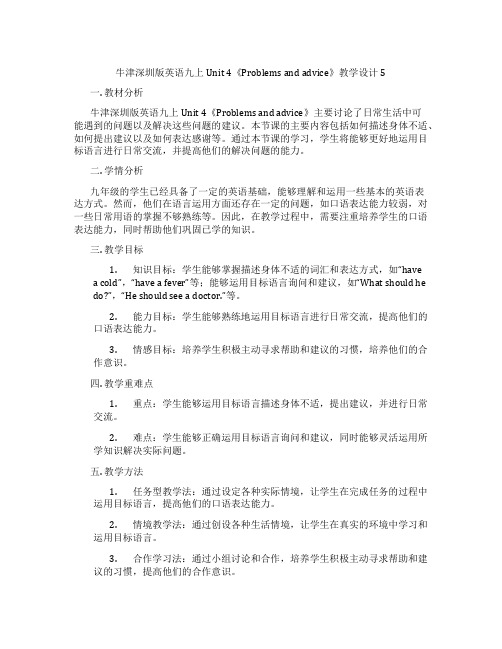
牛津深圳版英语九上Unit 4《Problems and advice》教学设计5一. 教材分析牛津深圳版英语九上Unit 4《Problems and advice》主要讨论了日常生活中可能遇到的问题以及解决这些问题的建议。
本节课的主要内容包括如何描述身体不适、如何提出建议以及如何表达感谢等。
通过本节课的学习,学生将能够更好地运用目标语言进行日常交流,并提高他们的解决问题的能力。
二. 学情分析九年级的学生已经具备了一定的英语基础,能够理解和运用一些基本的英语表达方式。
然而,他们在语言运用方面还存在一定的问题,如口语表达能力较弱,对一些日常用语的掌握不够熟练等。
因此,在教学过程中,需要注重培养学生的口语表达能力,同时帮助他们巩固已学的知识。
三. 教学目标1.知识目标:学生能够掌握描述身体不适的词汇和表达方式,如“havea cold”,“have a fever”等;能够运用目标语言询问和建议,如“What should hedo?”,“He should see a doctor.”等。
2.能力目标:学生能够熟练地运用目标语言进行日常交流,提高他们的口语表达能力。
3.情感目标:培养学生积极主动寻求帮助和建议的习惯,培养他们的合作意识。
四. 教学重难点1.重点:学生能够运用目标语言描述身体不适,提出建议,并进行日常交流。
2.难点:学生能够正确运用目标语言询问和建议,同时能够灵活运用所学知识解决实际问题。
五. 教学方法1.任务型教学法:通过设定各种实际情境,让学生在完成任务的过程中运用目标语言,提高他们的口语表达能力。
2.情境教学法:通过创设各种生活情境,让学生在真实的环境中学习和运用目标语言。
3.合作学习法:通过小组讨论和合作,培养学生积极主动寻求帮助和建议的习惯,提高他们的合作意识。
六. 教学准备1.教师准备:备好相关教学材料,如PPT、单词卡片等。
2.学生准备:预习本节课的内容,了解相关话题的背景知识。
Unitroblemsandadvice知识讲解
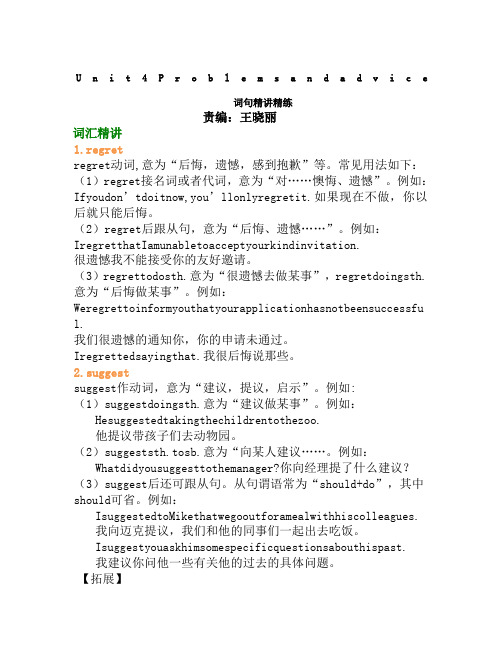
U n i t4P r o b l e m s a n d a d v i c e词句精讲精练责编:王晓丽词汇精讲1.regretregret动词,意为“后悔,遗憾,感到抱歉”等。
常见用法如下:(1)regret接名词或者代词,意为“对……懊悔、遗憾”。
例如:Ifyoudon’tdoitnow,you’llonlyregretit.如果现在不做,你以后就只能后悔。
(2)regret后跟从句,意为“后悔、遗憾……”。
例如:IregretthatIamunabletoacceptyourkindinvitation.很遗憾我不能接受你的友好邀请。
(3)regrettodosth.意为“很遗憾去做某事”,regretdoingsth.意为“后悔做某事”。
例如:Weregrettoinformyouthatyourapplicationhasnotbeensuccessfu l.我们很遗憾的通知你,你的申请未通过。
Iregrettedsayingthat.我很后悔说那些。
2.suggestsuggest作动词,意为“建议,提议,启示”。
例如:(1)suggestdoingsth.意为“建议做某事”。
例如:Hesuggestedtakingthechildrentothezoo.他提议带孩子们去动物园。
(2)suggeststh.tosb.意为“向某人建议……。
例如:Whatdidyousuggesttothemanager?你向经理提了什么建议?(3)suggest后还可跟从句。
从句谓语常为“should+do”,其中should可省。
例如:IsuggestedtoMikethatwegooutforamealwithhiscolleagues.我向迈克提议,我们和他的同事们一起出去吃饭。
Isuggestyouaskhimsomespecificquestionsabouthispast.我建议你问他一些有关他的过去的具体问题。
Unit4problemsandadvice
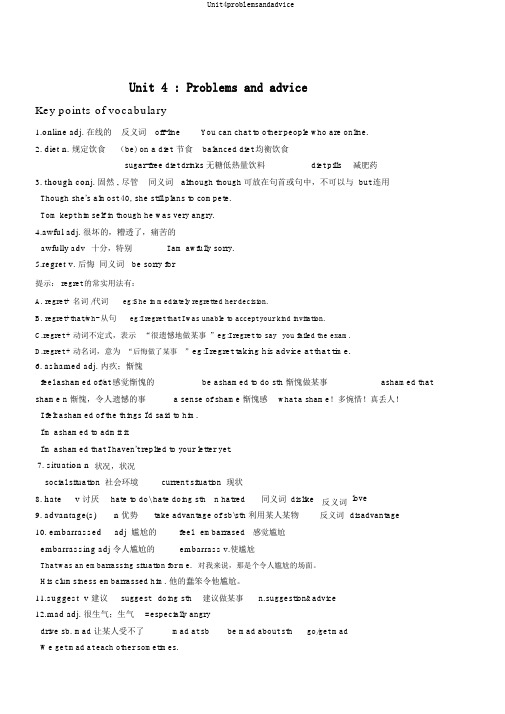
Unit 4 : Problems and adviceKey points of vocabulary1.online adj. 在线的反义词off-line You can chat to other people who are online.2. diet n. 规定饮食(be) on a diet节食balanced diet 均衡饮食sugar-free diet drinks 无糖低热量饮料diet pills减肥药3. though conj. 固然 , 尽管同义词although though 可放在句首或句中,不可以与but 连用Though she's almost 40, she still plans to compete.Tom kept himself in though he was very angry.4.awful adj. 很坏的,糟透了,痛苦的awfully adv十分,特别I am awfully sorry.5.regret v. 后悔同义词be sorry for提示: regret 的常实用法有:A. regret+ 名词 /代词eg:She immediately regretted her decision.B. regret+that/wh- 从句eg:I regret that I was unable to accept your kind invitation.C.regret + 动词不定式,表示“很遗憾地做某事”eg:I regret to say you failed the exam.D.regret + 动名词,意为“后悔做了某事”eg:I regret taking his advice at that time.6. ashamed adj. 内疚;惭愧feel ashamed of/at 感觉惭愧的be ashamed to do sth 惭愧做某事ashamed that shame n 惭愧,令人遗憾的事 a sense of shame 惭愧感what a shame!多惋惜!真丢人!I felt ashamed of the things I'd said to him.I'm ashamed to admit it.I'm ashamed that I haven't replied to your letter yet.7. situation n状况,状况social situation 社会环境current situation 现状8. hate v 讨厌hate to do\ hate doing sth n hatred同义词dislike9. advantage(s)n 优势take advantage of sb\sth 利用某人某物10. embarrassed adj 尴尬的feel embarrased感觉尴尬embarrassing adj 令人尴尬的embarrass v.使尴尬反义词反义词lovedisadvantageThat was an embarrassing situation for me.对我来说,那是个令人尴尬的场面。
Unit4.problems and advice必背材料

Unit4.Problems and advice必背复习材料一.词性变化1. ashamed adj.惭愧的---- shame n.羞愧2.advantage n.优势----disadvantage n.劣势3.suggest v.建议----suggestion n.建议4.mess n.杂乱----messy adj.杂乱的5.annoying adj.使恼怒的----annoyed adj.感到恼怒的;生气的6.fail v.不及格----failure n.失败eg: Failure is the mother of success.7.careless adj.粗心的----carelessly adv.粗心地----carelessness n.粗心----careful adj.细心的----carefully adv.细心地----carefulness n.细心8.polite adj.有礼貌的----impolite adj.没礼貌的----politeness n.礼貌二.近义词、释义1. awful----very bad or unpleasant2.regret----feel sorry about3. hate----dislike…very much4.suggest----advise5. mad----very angry6. annoying----making sb. feel angry7.fail----not pass ment----an opinion about sb./sth.9. none----not any 10. hear from sb.----get/receive a letter from sb.10.share sth with sb和某人分享某物---- to have or use sth with sb.11.on a diet----losing weight by eating less12.make a mess----make things untidy 13.out of place----uncomfortableugh at---- make jokes about/make fun of三.重点短语、句型、固定搭配1. see sb. doing sth看见某人正在做某事Eg: We saw a lady lying in the street.2.tell sb not to do sth. 告诉某人不要做某事Eg: My friends told me not to help her.3.regret not doing sth后悔没有做某事Eg: I regretted not telling him the truth.4. drive sb mad 使某人发疯Eg: He did such a stupid thing and drove his mum mad.5.have a habit of doing sth.有做某事的习惯Eg: The Browns have a habit of going out for a walk after dinner.6.without (doing )sth没有做某事Eg: He came to school without (having) breakfast.7. worry about… =be worried about…担心...Eg: Don’t worry about me.= Don’t be worried about me.8. Why not do sth =Why don’t you do sth.为什么不做某事Eg:Why not tell him the truth? =Why don’t you tell him the truth?9. have a problem with sth =have a problem/trouble (in) doing sth 做某事有困难Eg: I had a problem with my English this term.=I had a problem/trouble learning English this term.10.none of one’ business 不关某人的事Eg: It’s none of your business. 这不关你的事.11.decide to do sth =make a decision to do sth =make up one’s mind to do sth=decide on doing sth决定做某事四.句子成分(Sentence elements)(一)句子成分的定义:构成句子的各个部分叫做句子成分。
unit 4 Problems and advice
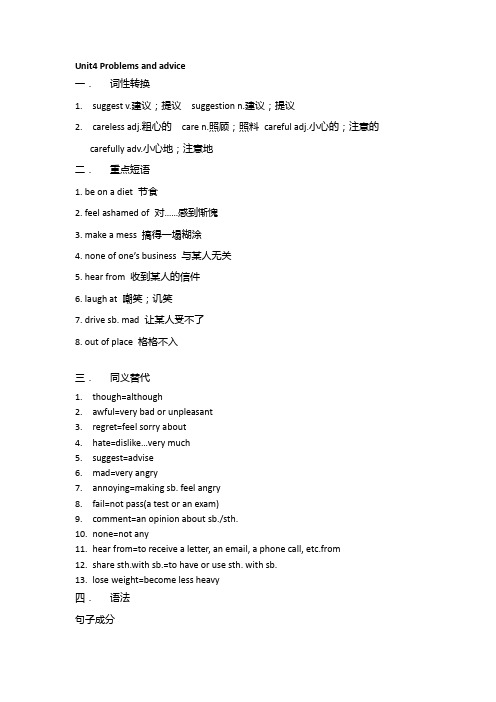
Unit4 Problems and advice一.词性转换1.suggest v.建议;提议suggestion n.建议;提议2.careless adj.粗心的care n.照顾;照料careful adj.小心的;注意的carefully adv.小心地;注意地二.重点短语1. be on a diet 节食2. feel ashamed of 对……感到惭愧3. make a mess 搞得一塌糊涂4. none of one’s business 与某人无关5. hear from 收到某人的信件6. laugh at 嘲笑;讥笑7. drive sb. mad 让某人受不了8. out of place 格格不入三.同义替代1.though=although2.awful=very bad or unpleasant3.regret=feel sorry about4.hate=dislike…very much5.suggest=advise6.mad=very angry7.annoying=making sb. feel angry8.fail=not pass(a test or an exam)ment=an opinion about sb./sth.10.none=not any11.hear from=to receive a letter, an email, a phone call, etc.from12.share sth.with sb.=to have or use sth. with sb.13.lose weight=become less heavy四.语法句子成分Unit4巩固练习一.请写出下列单词的同根词1.though ________2.suggest ____________3.carelessl __________二.请写出下列单词或词组的同义词或词组1.although____________2.an opinion about sb./sth.______________3.making sb feel angry_______________4.advise_____________5.have or use sth. with sb.______________6.dislike…very much______________7.not any________________8.receive a letter ,an email, a phone call,etc. from______________9.very bad or unpleasant__________________10. not pass(a test or an exam)_________________ 11.very angry_________12.become less heavy______________ 13.feel sorry about_____________三.根据句子意思,用所给词的适当形式填空。
牛津深圳版英语九年级上册:Unit 4 《Problems and advice》 教学设计5
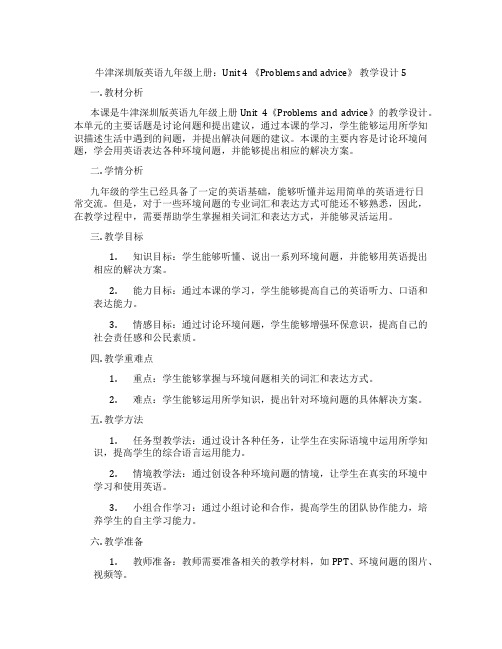
牛津深圳版英语九年级上册:Unit 4 《Problems and advice》教学设计5一. 教材分析本课是牛津深圳版英语九年级上册Unit 4《Problems and advice》的教学设计。
本单元的主要话题是讨论问题和提出建议,通过本课的学习,学生能够运用所学知识描述生活中遇到的问题,并提出解决问题的建议。
本课的主要内容是讨论环境问题,学会用英语表达各种环境问题,并能够提出相应的解决方案。
二. 学情分析九年级的学生已经具备了一定的英语基础,能够听懂并运用简单的英语进行日常交流。
但是,对于一些环境问题的专业词汇和表达方式可能还不够熟悉,因此,在教学过程中,需要帮助学生掌握相关词汇和表达方式,并能够灵活运用。
三. 教学目标1.知识目标:学生能够听懂、说出一系列环境问题,并能够用英语提出相应的解决方案。
2.能力目标:通过本课的学习,学生能够提高自己的英语听力、口语和表达能力。
3.情感目标:通过讨论环境问题,学生能够增强环保意识,提高自己的社会责任感和公民素质。
四. 教学重难点1.重点:学生能够掌握与环境问题相关的词汇和表达方式。
2.难点:学生能够运用所学知识,提出针对环境问题的具体解决方案。
五. 教学方法1.任务型教学法:通过设计各种任务,让学生在实际语境中运用所学知识,提高学生的综合语言运用能力。
2.情境教学法:通过创设各种环境问题的情境,让学生在真实的环境中学习和使用英语。
3.小组合作学习:通过小组讨论和合作,提高学生的团队协作能力,培养学生的自主学习能力。
六. 教学准备1.教师准备:教师需要准备相关的教学材料,如PPT、环境问题的图片、视频等。
2.学生准备:学生需要预习本课的内容,了解一些环境问题的背景知识。
七. 教学过程1.导入(5分钟)教师通过展示一些环境问题的图片或视频,引导学生关注环境问题,激发学生的学习兴趣。
2.呈现(10分钟)教师通过PPT呈现本课的主要内容,包括环境问题的词汇和表达方式,以及如何提出解决方案。
沪教版英语九年级上册知识点总结UNIT 4 Problem and advice(附答案)

(be) on a diet
节食
2
laugh at
嘲笑
3
be/feel ashamed of
对……感到惭愧
4
drive sb. Mad
让某人受不了
5
make a mess
搞得一塌糊涂
6
out of place
格格不入
7
none of one's business
与某人无关
8
hear from
收到某人的信件
[ˈkɒment]
n.评论
19
request
[rɪˈkwest]
n.要求,请求
20
polite
[pəˈlaɪt]
adj.有礼貌的
21
none
[nʌn]
pron.没有一个,毫无
22
exam
[ɪg'zæm]
n.考试
23
(be)on a diet
节食
24
laugh at
['lɑːfət]
嘲笑,讥笑
25
feel ashamed of
UNIT4 Problem and advice
一、词汇短语学习
(一)课内单词
序号
单词
音标
中文意思
1
online
[ˌɒnˈlaɪn]
adj.在线的
2
model
[ˈmɒdl]
n.模特儿
3
diet
[daɪ]
n.规定饮食(为健康或减肥等目的)
4
though
[ðəʊ]
conj.虽然,尽管
5
awful
[ˈɔːfʊl]
广州地区沪教牛津版九年级上册 9AUnit 4 Problems and advice单词、短语、语法解析
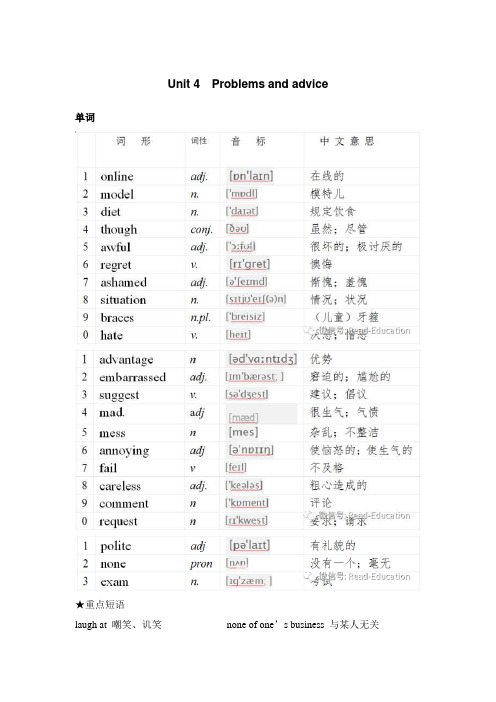
Unit 4 Problems and advice单词★重点短语laugh at 嘲笑、讥笑none of one’s business 与某人无关feel ashamed of 对....感到惭愧hear from 收到某人的信件/电话/电子邮件drive sb. mad 让某人受不了(be) on a diet 节食make a mess 搞得一塌糊涂on diet节食;减肥out of place 格格不入none of one’s business 与某人无关Unit4 知识考点★词汇解析1.online adj. 在线的反义词off-lineYou can chat to other people who are online.你可以和在线的其他人聊天。
2.diet n. 规定饮食(be) on a diet 节食拓展:go on a diet节食,减肥on a diet遵守饮食特别规定的on diet节食;减肥well-balanced diet均衡饮食diet food减肥食物;规定的食物light diet易消化的饮食;清淡饮食3.regret v. 懊悔同义词be sorry forregret doing sth后悔做某事regret (that)+从句I now regret leaving school so young.我后悔年纪轻轻就辍学了。
He was beginning to regret that he'd come alone.他开始后悔一个人回来。
4.though conj. 虽然, 尽管同义词althoughthough 可放在句首或句中,不能与but 连用Though she's almost 40, she still plans to compete.即使她已经40岁了,她仍然打算参赛。
5.ashamed adj. 惭愧;羞愧feel ashamed of/at对...感到羞愧be ashamed to do sth对做某事感到羞愧ashamed that+从句I felt ashamed of the things I'd said to him.我对自己跟他所说的话感到羞愧。
Unit 4 Problems and advice——句子成分与基本句型
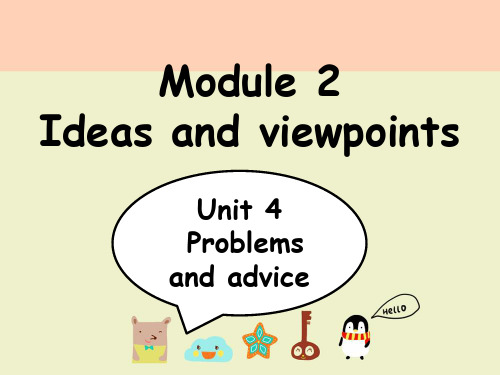
二、宾语 宾语可以用下面这些东西表示:
1.She lived a happy l名if词e.(
2.I love you代.(词
)
数词
3.We need two.(
)
4.Do you mind my
)
动名词 ope不ni定ng式 the
door?(
)
疑问词+不定式
5.He began to learn Engli从sh句 a year
)
She is sitting at the desk, doing her homework.
(地点,伴随 )
My father worked in this school ten years ago.
( 地点,时间 )
Though he is young, he knows a lot.(让步 )
二、谓语
谓语:说明主语做什么或怎么样。通常由 _动__词___ 充当。动词常分为实义动词,连系 动词,情态动词和助动词。
• 1. We love China. • 2. We have finished reading this book. • 3. He can speak English. • 4. She seems tired.
now. (
)
He is o分ut词of danger.(
)
The news was ex从ci句ting./They were excited
at the news.(
)
三、定语 定语可以用下面这些东西表示:
It’s a red ca形r.容(词
They
live
in
) 副词the
room
Unit4Problemsandadvice知识点讲解精选精练牛津深圳版英语九年级上册
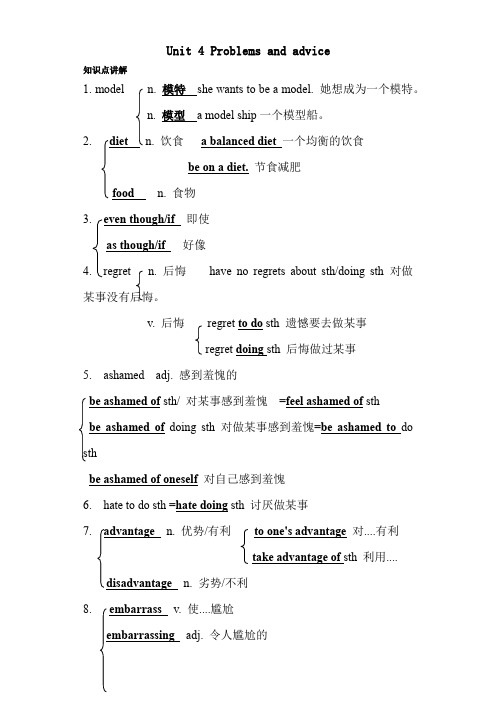
17.A.peopleB.people’sC.peoplesD.peoples’
18.A.a dayB.one dayC.one weekD.a week
19.A.atB.ofC.forD.to
fail to dosth未能做到某事
failuren.失败
24.carev/n照顾
carefuladj.小心的,仔细的
Hale Waihona Puke carelessadj.粗心的25.be sure todo sth一定去做某事
be sure of/aboutsth对...有把握
26.politeadj.有礼貌的
impoliteadj.不礼貌的
Don’t take your exams too seriously. Some students may think that the rest of their life13them. That’s not true. Instead, just regard the exams as another difficulty14you will overe. You have overe all kinds of difficulties in your life so far. You are15to overe the difficulty of the exams!
diseasen.疾病
15.keep v.保持keephealthy/fit保持健康
keepdoing sth坚持做某事
keepsb from doing sth阻止某人做某事
v.饲养keep cows on the farm在农场里养牛
九上Unit4_Problems_and_Advice_

unit4 Problems and Advice【词汇讲解】1.(be) on a diet 节食我们都不应该为了减肥而节食。
2.regret v. 懊悔同义词regret doing sth 后悔/内疚做过某事regret to do sth 遗憾地去做某事I now regret school so young. 我现在后悔如此年轻就离开学校了。
I regret you that you can't pass the examination.我很遗憾地告诉你,你没有通过考试。
see sb. doing sth. 看到某人正在做某事see sb. do sth 看到某人做过(经常做)某事我看见小偷进来了。
我经过那个公园时,我看见一个小女孩在哭。
3.though 虽然, 尽管= althoughthough放在句首或句中,不能与but连用尽管数学很难,但是他一直都很努力。
4.feel ashamed of sth 对……感到惭愧我对我跟他说的东西感到惭愧。
5.drive sb. mad 让某人受不了他说的话让我受不了。
6.mess n. 杂乱;不整洁messy adj.杂乱的;不整洁的make a mess 搞得一塌糊涂The house was a _____________. The house was _____________.When I got home, the house was _______________. 当我到家时,房子被搞得一塌糊涂。
7.annoying adj. 令人恼怒\生气的annoyed adj. 感到恼怒\气恼的annoy v. 使生气, 惹恼类似构词:interest interesting interestedsurprise surprising surprisedfrighten frightening frightenedexcite exciting excited8.out of place 格格不入在她的生日聚会上,我觉得格格不入。
Unit 4 Problems and advice知识精讲

Unit 4 Problems and advice (1)Date:_______ name:_______【知识要点】★ 必记单词diet n. 规定饮食 though conj. 虽然;尽管awful adj. 很坏的;极讨厌的 regret v. 懊悔ashamed adj. 惭愧;羞愧 situation n. 情况;状况hate v. 厌恶;憎恶 advantage n. 优势embarrassed adj. 窘迫的;尴尬的 suggest v. 建议;提议mad adj. 很生气;气氛 annoying adj. 使恼怒的;使生气的 fail v. 不及格 careless adj. 粗心造成的polite adj. 有礼貌的 none pron. 没有一个;毫无 ★ 常考短语(be) on a diet 节食 laugh at 嘲笑;讥笑feel ashamed of 对……感到惭愧 drive sb. mad 让某人受不了shout at 对某人大叫 be polite to 对……无礼None of your business 不关你的事 hear from 收到……的来信keep doing sth. 不停地做某事 give sth. back 归还某物★ 课文解析 1. We saw a lady lying in the street.see sb. doing sth. “看见某人正在做某事”辨析:see sb. doing sth.与see sb. do sth.I saw him repairing his bike. 我看见他正在修他的自行车。
I saw him repair his bike. 我看见他修了他的自行车。
2. Though I wanted to help her, my friends told me not to.though conj. 虽然;尽管,和although 同义,一般可以换用,都引导让步状语从 句,但不能与but 连用。
Unit4+Problems+and+advice+单词课件 牛津深圳版九年级英语上册
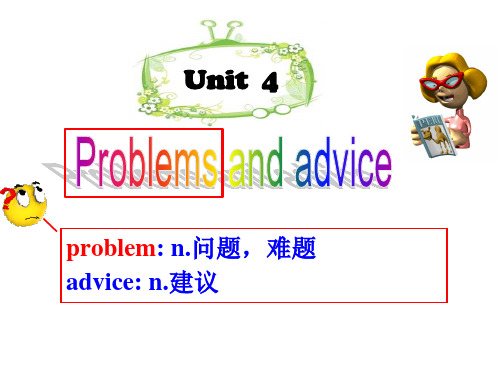
mad adj. 很生气;气愤
drive sb. mad 让某人受不了
1) be mad at sb 对某人生气 2) be mad about sth 为...而生气 3) go/get mad 生气
mess messy
n. 杂乱;不整洁 adj. 杂乱的;不整洁的
make a mess 搞得一塌糊涂
regret to do sth.对要做的事遗憾.(未做) regret doing sth.后悔做了某事.(已做)
(1) He regrets not learning English well before. 他后悔以前没有学好英语。 (2) I regret to tell you that you didn’t pass the examination.
• be on a diet
• make sb. very angry
• drive sb. mad
• eat less and become thinner
• none of one’s business• it has nothing to do with…
( ) 1. In this country, the weather is usually awful.
in this situation在这种情况下
hate v. 厌恶;憎恶
dislike love/like
advantage n. 优势
劣势disadvantage
have the advantage of… 有…的优势
take advantage of… 利用…
One of this car’s___a_d_v_a_n_ta_g_e_s____(advantage) is that it doesn’t use much gasoline.
2014新牛津版九年级英语上册unit4 Problems and Advice词汇句型知识点解析

2014—2015新牛津版九年级英语上册词汇句型知识点解析unit4 Problems and Advice词汇部分1 lie ;躺,位于【考点解析】1. n. 谎言、谎话。
作可数名词,意为谎言、谎话。
white lies意为善意的谎言。
2. lie作不及物动词。
(1) v. 撒谎,说谎。
过去式和过去分词分别是lied,lied。
常用于短语lie to sb.(2) v. 躺,位于。
过去式和过去分词分别是lay,lain。
词汇2 regret v. 懊悔,后悔,遗憾【考点解析】1. regret作动词,意为后悔,懊悔,遗憾。
2. regret的常用短语为regret to do sth.和regret doing sth.。
其用法与remember,forget类似。
接to do sth.是指未做某事,接doing sth.是指已做某事。
词汇3 ashamed adj. 惭愧的,羞愧的【考点解析】1. ashamed意为惭愧的,羞愧的,常用作be ashamed of sb./sth.。
2. ashamed的名词形式是shame,常用What a shame!词汇4 embarrassed adj. 窘迫的,尴尬的名词:embarrassment【考点解析】1. embarrassed意为尴尬的,窘迫的。
常用于短语be embarrassed about/at sth.。
2. embarrassed还能用于句型be embarrassed to do sth.词汇5 drive v. 开车,驾驶,(开车)送某人;迫使,使得【考点解析】1. drive 意为开车,驾驶。
drive sb. 意为开车送某人。
2. drive作及物动词,意为迫使,使得,常用于drive sb. adj.和drive sb. to do sth.,意为让某人……。
例如:Making a mess in the room drives me crazy.房间里乱七八糟的,让我快疯了。
牛津深圳版英语九年级上册:Unit 4 《Problems and advice》 说课稿1

牛津深圳版英语九年级上册:Unit 4 《Problems and advice》说课稿1一. 教材分析《牛津深圳版英语九年级上册》Unit 4《Problems and advice》主要讨论了日常生活中可能遇到的问题以及相应的解决方法。
本节课的主要内容包括:如何处理家庭作业过多的问题,如何应对考试压力,如何保持健康的生活方式以及如何处理人际关系等。
通过本节课的学习,学生能够提高自己的解决问题的能力,同时增强自己的英语表达能力。
二. 学情分析九年级的学生已经具备了一定的英语基础,能够理解和表达日常生活中的一些常见问题。
但是,他们的英语听说读写能力参差不齐,部分学生在口语表达方面还存在一定的困难。
此外,由于九年级的学生正处于青春期末期,他们在处理人际关系和应对生活压力方面存在一些困惑,因此对这方面的讨论会非常有帮助。
三. 说教学目标1.知识目标:学生能够掌握讨论问题的相关词汇和表达方式,如“家庭作业过多”、“考试压力”等。
2.能力目标:学生能够用英语描述和讨论日常生活中的问题,并给出相应的解决建议。
3.情感目标:学生能够通过讨论问题,学会如何处理人际关系,减轻生活压力,提高生活质量。
四. 说教学重难点1.重点:学生能够用英语描述和讨论日常生活中的问题,并给出相应的解决建议。
2.难点:学生能够正确使用情态动词和疑问词等表达方式,使讨论更加深入和自然。
五. 说教学方法与手段1.交际法:通过小组讨论,角色扮演等方式,让学生在实际语境中运用英语,提高他们的口语表达能力。
2.任务型教学法:通过完成各种任务,如问卷,解决问题等,让学生在实践中学习和应用英语。
3.情境教学法:通过创设各种生活情境,让学生在真实的环境中学习和使用英语。
六. 说教学过程1.导入:通过提问方式引导学生谈论日常生活中遇到的问题,激发学生的学习兴趣。
2.新课呈现:通过图片,情境等方式展示本节课的主要内容,让学生理解和掌握相关词汇和表达方式。
牛津深圳版英语九年级上册:Unit 4 《Problems and advice》 教学设计7
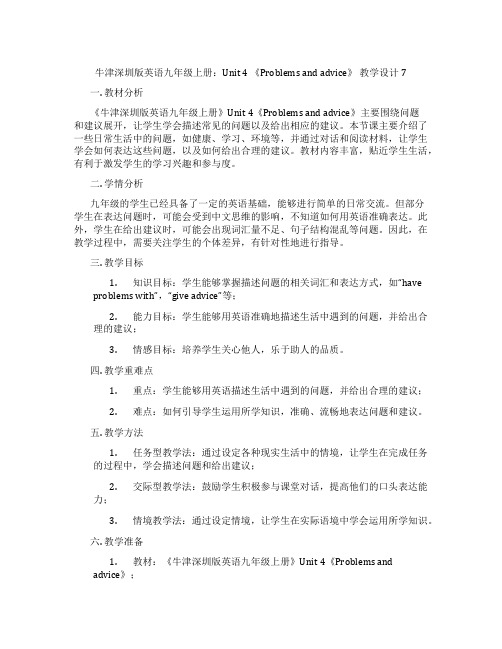
牛津深圳版英语九年级上册:Unit 4 《Problems and advice》教学设计7一. 教材分析《牛津深圳版英语九年级上册》Unit 4《Problems and advice》主要围绕问题和建议展开,让学生学会描述常见的问题以及给出相应的建议。
本节课主要介绍了一些日常生活中的问题,如健康、学习、环境等,并通过对话和阅读材料,让学生学会如何表达这些问题,以及如何给出合理的建议。
教材内容丰富,贴近学生生活,有利于激发学生的学习兴趣和参与度。
二. 学情分析九年级的学生已经具备了一定的英语基础,能够进行简单的日常交流。
但部分学生在表达问题时,可能会受到中文思维的影响,不知道如何用英语准确表达。
此外,学生在给出建议时,可能会出现词汇量不足、句子结构混乱等问题。
因此,在教学过程中,需要关注学生的个体差异,有针对性地进行指导。
三. 教学目标1.知识目标:学生能够掌握描述问题的相关词汇和表达方式,如“haveproblems with”,“give advice”等;2.能力目标:学生能够用英语准确地描述生活中遇到的问题,并给出合理的建议;3.情感目标:培养学生关心他人,乐于助人的品质。
四. 教学重难点1.重点:学生能够用英语描述生活中遇到的问题,并给出合理的建议;2.难点:如何引导学生运用所学知识,准确、流畅地表达问题和建议。
五. 教学方法1.任务型教学法:通过设定各种现实生活中的情境,让学生在完成任务的过程中,学会描述问题和给出建议;2.交际型教学法:鼓励学生积极参与课堂对话,提高他们的口头表达能力;3.情境教学法:通过设定情境,让学生在实际语境中学会运用所学知识。
六. 教学准备1.教材:《牛津深圳版英语九年级上册》Unit 4《Problems andadvice》;2.课件:相关图片、视频、音频等教学资源;3.练习题:针对本节课内容的练习题;4.小组活动准备:分组名单、任务分配等。
七. 教学过程1.导入(5分钟)利用图片或视频展示一些日常生活中的问题,如健康、学习、环境等,引导学生思考并讨论这些问题。
- 1、下载文档前请自行甄别文档内容的完整性,平台不提供额外的编辑、内容补充、找答案等附加服务。
- 2、"仅部分预览"的文档,不可在线预览部分如存在完整性等问题,可反馈申请退款(可完整预览的文档不适用该条件!)。
- 3、如文档侵犯您的权益,请联系客服反馈,我们会尽快为您处理(人工客服工作时间:9:00-18:30)。
•
• •
There is a pen on the desk. 名词做主语
Predicting the future is interesting. 动名词做主语 To be a doctor is my dream. 不定式短语做主语
谓语
表示人或事物(主语)的动作和存在的状态.英语中由动词be、动词have和行为动词 来充当谓语动词,句子的时态和语态是通过谓语表现出来。 谓语动词往往由一个或一个以上的助动词或情态动词加上主要动词构成。 • • • • 分析句子的主语和谓语 Mr. Li teaches English. He can play the piano. My parents and I are having dinner.
宾语补足语
宾语补足语(宾补):有些及物动词除了要有一个宾语之外, 还须加上一个补足语。如果 没有补足语(宾补), 有时候句子的意思就不完整。 充当宾补的有: 1. 形容词作宾语补足语 The sun keeps us warm. 2. 介词短语作宾语补足语: I found her in the room. 3. 副词作宾语补足语。 Please let him in. 4. 名词作宾语补足语。 We made him monitor of the class. 5. 动词不定式和分词也能用作宾语补足语。 I asked him to come.
unit 4 problems and advice
主讲:
主语
一个句子中需要加以说明或描述的对象。主语的位置:一般位于句首,由名词、代词、数词或相当于名词的词、短语等 充当。 • • • • The school is far from here. 名词做主语
She goes to school by bike. 代词做主语 Eight is a lucky number. 数词做主语 The blind need more help. 名词化的形容词做主语 Nhomakorabea宾语
是动作的对象或承受者。及物动词必须跟宾语.及物动词:直接接宾语的谓语动词. 不及物动词:不能直接带宾语的谓语动词.宾语可由名词、代词、数词、不定式、 动名词、从句构成. I saw a plane in the sky just now. 名词做宾语 I want three. 数词做宾语 I like going shopping. 动名词做宾语 We think predicting the future is hard. 宾语从句
表语
用来说明主语的身份、特征、性质、状态。表语的位置用在动词be和系动词的后面。 名词、代词、数词、介词短语、副词等都可以和连系动词一起构成复合谓语。 Your pen is on the desk. He got very angry. My dream is to have a robot. 常见的系动词 1. be动词 2. 与感觉有关的动词 look, sound, smell, taste, feel 等 3. 表示状态变化的动词,意为“变得” “变成” 如 get, grow, turn等 上述两类词作连系动词时要用形容词作表语,千万不能用副词。
状语
修饰动词,形容词或副词,有的修饰全句, 用以说明地点, 时间, 方式, 程度, 原因, 目的, 结果, 条 件, 让步等. 1. 副词作状语: The old man is walking slowly. 表方式 The boy is very clever. 表程度 2. 介词短语作状语: I have lived in Shanghai for five years. 表时间 3. 不定式作状语 I come here to see you. 表目的 4. 现在分词作状语 The teacher came in, holding a book in his hand. 表方式 5. 状语从句 We’ll go shopping if it doesn’t rain tomorrow.
定语
定语修饰名词或代词(即在汉语里的……的) 1. 形容词作定语(一般放在被修饰语之前,修饰不定代词时放在后面) They have a clever son. I have something important to tell you. 2. 名词作定语: Is it a color film? 名词作定语一般用单数形式, 如: school bus, ticket office, paper flowers,但也有例外,如: sports meeting, clothes shop,man 和 woman修饰的名词如果是复数,它们总以复数的形式作定语,如:men drivers , women doctors 3. 代词作定语: This song is better than that one. 4. 数词作定语:带有数字的复合形容词.当复合形容词用连字号连接时,其中的名词要用单数形式. a two-day holiday a three-year-old boy There are only thirty students in our class. 5. 副词作定语(放在被修饰词之后): Do you know the young man over there? 6. 介词短语作定语(放在被修饰词之后): The students in our class like swimming.
